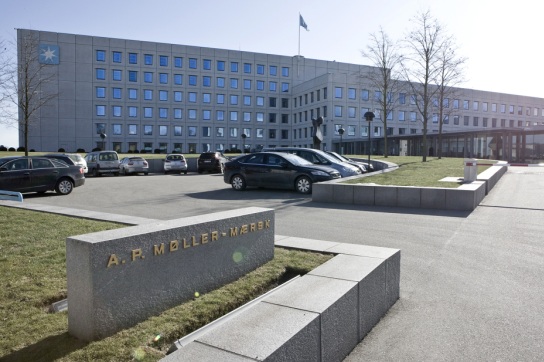 Danish shipping and oil giant A.P. Moller-Maersk A/S announced it is dividing its portfolio of businesses into two independent divisions—an integrated transport & logistics division and an energy division.
Danish shipping and oil giant A.P. Moller-Maersk A/S announced it is dividing its portfolio of businesses into two independent divisions—an integrated transport & logistics division and an energy division.
In a statement released September 22, A.P. Moller-Maersk said this decision follows its announcement on June 23, 2016 that it would “perform a review focusing on the strategic and structural options for the Maersk Group with the objective of generating growth, increasing agilities and synergies and unlocking and maximising shareholder value with the long-term view.”
Michael Pram Rasmussen, chairman of the board, said the transport and oil industries operate under very different underlying fundamentals and in competitive environments.
“Separating our transport and logistics businesses and our oil and oil related businesses into two independent divisions will enable both to focus on their respective markets,” he added.
Transport & Logistics will focus on “enhancing synergies” between its businesses, while Energy will “pursue individual strategic solutions” to ensure agility for its businesses, he said.
Transport & Logistics
This division will consist of Maersk Line, APM Terminals, Damco, Svitzer, and Maersk Container Industry based on a one-company structure with multiple brands.
Since 2008, the group has focused on building a lean global conglomerate in which each business unit operated on “arm’s-length principles.” Now, however, it has moved to integrate transport and logistics activities to enable growth through stronger collaboration and reduced capital expenses, said the company statement.
To deliver long-term profitable growth, Transport & Logistics will be improving its product offering and customer experience “based on the combined capabilities of Maersk Line, APM Terminals and Damco in combination with industry leading digital solutions,” said A.P. Moller-Maersk.
Moreover, by operating as one entity, Transport & Logistics will be able to “harvest synergies and optimize operations to secure the industry’s most effective and reliable network.”
Strong capital discipline and better utilization of assets will also be ensured. When making investments, acquisitions will be the preferred option.
The strategies for the individual businesses will be adjusted accordingly, the company added.
Maersk Line will grow market share organically and through acquisitions.
APM Terminals will focus on cost and utilization, improve operations, and enhance service to existing and new third-party customers.
Damco and Maersk Line will collaborate to deliver new innovative customer solutions supported by significant investments into digital technology.
Svitzer will pursue growth through increased synergies with APM Terminals and Maersk Line.
Maersk Container Industry will collaborate with Maersk Line on technology development and efficient production planning.
A.P. Moller-Maersk said, “We expect to deliver revenue growth, cost efficiency and margin improvements. The estimated synergies are expected to generate up to two percentage points ROIC improvement over a period of three years. No material synergies are expected in 2016.”
Energy Division
On the other hand, energy will consist of Maersk Oil, Maersk Drilling, Maersk Supply Service, and Maersk Tankers.
The expected reduction in oil supply in the coming years provides opportunities to grow Maersk Oil based on the company’s key technical competencies, said the company.
Maersk Oil will adjust its current strategy to focus its portfolio in fewer geographies to gain scale in basins, particularly in the North Sea, where it can leverage its strong capabilities within subsurface modelling, well technology, and efficient operations.
Maersk Oil aims to strengthen its portfolio through acquisitions or mergers.
Further, Maersk Oil will mature existing key development projects, while keeping exploration activities and expenses down. While the focus is on reducing capital expenditures, investments in strategic projects already sanctioned or under development will continue as planned.
Maersk Drilling, Maersk Supply Services, and Maersk Tankers will continue to operate with the existing fleet and order book. Additional investments in the group’s offshore service businesses and Maersk Tankers will be limited.
Management reshuffle
Financial reporting for the new structure will be implemented from the financial year 2017.
The registered management of A.P. Moller-Maersk A/S will also undergo changes. Soren Skou will continue as group CEO and CEO of the Transport & Logistics division.
Claus V. Hemmingsen will be appointed group vice CEO effective on October 1, 2016 and CEO for the Energy division.
Jakob Stausholm will be appointed group CFO as of December 1, 2016, replacing group CFO Trond Westlie who leaves on the same date.
Jakob Thomasen will step down as member of the registered management and CEO of Maersk Oil effective on October 1 and leave the group on November 1.
Kim Fejfer will step down as member of the registered management effective on October 1 and as CEO of APM Terminals effective on November 1.
Skou said: “Both Energy and Transport & Logistics have strategies positioning them for growth and strategic agility. Transport & Logistics will be able to provide new and digitised world-class solutions for customers, while at the same time capture functional cost synergies and better utilization of existing assets.”
Energy, he said, will “leverage Maersk Oil’s expertise and gain scale in select geographies, particularly in the North Sea. Its structural agility will enable management to pursue new and different structural solutions and investment.”
Ane Maersk Mc-Kinney Uggla, chairman of A.P. Moller Holding A/S, said they welcome the new strategy and structure announced by A.P. Moller-Maersk A/S. “A.P. Moller Holding will continue to be an active and influential owner of A.P. Moller-Maersk activities, applying our core values and name where relevant; and as stated in the trust deed of the A.P. Moller Foundation.”
She assured that A.P. Moller Holding will remain as “an influential shareholder in business units undergoing separate structural changes: they will continue to be part of the A.P. Moller family.”





